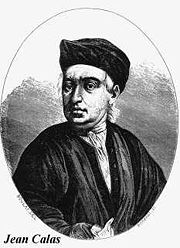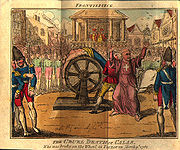
Jean Calas
Encyclopedia


Toulouse
Toulouse is a city in the Haute-Garonne department in southwestern FranceIt lies on the banks of the River Garonne, 590 km away from Paris and half-way between the Atlantic Ocean and the Mediterranean Sea...
, France
France
The French Republic , The French Republic , The French Republic , (commonly known as France , is a unitary semi-presidential republic in Western Europe with several overseas territories and islands located on other continents and in the Indian, Pacific, and Atlantic oceans. Metropolitan France...
, famous for having been the victim of a biased trial
Trial (law)
In law, a trial is when parties to a dispute come together to present information in a tribunal, a formal setting with the authority to adjudicate claims or disputes. One form of tribunal is a court...
due to his being a Protestant. In France
France
The French Republic , The French Republic , The French Republic , (commonly known as France , is a unitary semi-presidential republic in Western Europe with several overseas territories and islands located on other continents and in the Indian, Pacific, and Atlantic oceans. Metropolitan France...
, he is a symbol of Christian
Christian
A Christian is a person who adheres to Christianity, an Abrahamic, monotheistic religion based on the life and teachings of Jesus of Nazareth as recorded in the Canonical gospels and the letters of the New Testament...
religious intolerance
Religious intolerance
Religious intolerance is intolerance against another's religious beliefs or practices.-Definition:The mere statement on the part of a religion that its own beliefs and practices are correct and any contrary beliefs incorrect does not in itself constitute intolerance...
, along with Jean-François de la Barre
Jean-François de la Barre
Jean-François Lefevre de la Barre was a French nobleman, famous for having been tortured and beheaded before his body was burnt on a pyre along with Voltaire's "Philosophical Dictionary". He is often said to have been executed for not saluting a procession, but the elements of the case were far...
and Pierre-Paul Sirven
Pierre-Paul Sirven
Pierre-Paul Sirven is one of Voltaire's causes célèbres in his campaign to écraser l'infame .- Background :Sirven became an archivist and notary in Castres, southern France, in 1736...
.
Calas, along with his wife, was a Protestant. France was then a mostly Catholic
Catholic
The word catholic comes from the Greek phrase , meaning "on the whole," "according to the whole" or "in general", and is a combination of the Greek words meaning "about" and meaning "whole"...
country; Catholicism was the state religion
State religion
A state religion is a religious body or creed officially endorsed by the state...
. While the harsh oppression of Protestantism initiated by King Louis XIV
Louis XIV of France
Louis XIV , known as Louis the Great or the Sun King , was a Bourbon monarch who ruled as King of France and Navarre. His reign, from 1643 to his death in 1715, began at the age of four and lasted seventy-two years, three months, and eighteen days...
had largely receded, Protestants were, at best, tolerated. Louis, one of the Calas' sons, converted to Catholicism in 1756. On 13–14 October 1761, another of the Calas' sons, Marc-Antoine
Marc-Antoine Calas
Marc-Antoine Calas was eldest son of French merchant Jean Calas. His death occurred under mysterious circumstances, and his father was tortured to death on a breaking wheel on March 10, 1762, after being convicted of killing his son....
, was found dead on the ground floor of the family's home. Rumors had it that Jean Calas had killed his son because he, too, intended to convert to Catholicism. The family, interrogated, first claimed that Marc-Antoine had been killed by a murderer. Then they declared that they had found Marc-Antoine dead, hanged; since suicide
Suicide
Suicide is the act of intentionally causing one's own death. Suicide is often committed out of despair or attributed to some underlying mental disorder, such as depression, bipolar disorder, schizophrenia, alcoholism, or drug abuse...
was then considered a heinous crime against oneself, and the dead bodies of suicides were defiled, they had arranged for their son's suicide to look like a murder.
On 9 March 1762, the parlement
Parlement
Parlements were regional legislative bodies in Ancien Régime France.The political institutions of the Parlement in Ancien Régime France developed out of the previous council of the king, the Conseil du roi or curia regis, and consequently had ancient and customary rights of consultation and...
(regional legislature that also tried cases) of Toulouse
Toulouse
Toulouse is a city in the Haute-Garonne department in southwestern FranceIt lies on the banks of the River Garonne, 590 km away from Paris and half-way between the Atlantic Ocean and the Mediterranean Sea...
sentenced Jean Calas to death on the wheel
Breaking wheel
The breaking wheel, also known as the Catherine wheel or simply the wheel, was a torture device used for capital punishment in the Middle Ages and early modern times for public execution by bludgeoning to death...
. On 10 March, at the age of 64, he died torture
Torture
Torture is the act of inflicting severe pain as a means of punishment, revenge, forcing information or a confession, or simply as an act of cruelty. Throughout history, torture has often been used as a method of political re-education, interrogation, punishment, and coercion...
d on the wheel, while still very firmly claiming his innocence. Voltaire
Voltaire
François-Marie Arouet , better known by the pen name Voltaire , was a French Enlightenment writer, historian and philosopher famous for his wit and for his advocacy of civil liberties, including freedom of religion, free trade and separation of church and state...
, contacted about the case, after initial suspicions that Calas was guilty of anti-Catholic fanaticism
Fanaticism
Fanaticism is a belief or behavior involving uncritical zeal, particularly for an extreme religious or political cause or in some cases sports, or with an obsessive enthusiasm for a pastime or hobby...
had subsided, began a campaign to get Calas's sentence overturned. His efforts were successful, and on 9 March 1765 the unfortunate Jean Calas was posthumously exonerated
Exoneration
Exoneration occurs when a person who has been convicted of a crime is later proved to have been innocent of that crime. Attempts to exonerate convicts are particularly controversial in death penalty cases, especially where new evidence is put forth after the execution has taken place.The term...
on all charges.
External links
- l'Affaire Calas (in French)
- VoltaireVoltaireFrançois-Marie Arouet , better known by the pen name Voltaire , was a French Enlightenment writer, historian and philosopher famous for his wit and for his advocacy of civil liberties, including freedom of religion, free trade and separation of church and state...
's Traité sur la Tolérance à l'occasion de la mort de Jean Calas (in French)

